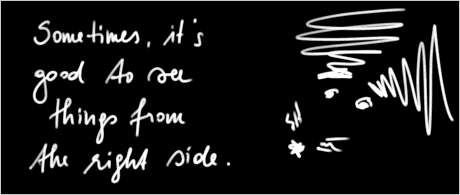Why there is double bind
October 3rd, 2006I think it is high time to get rid of the concepts of good versus bad and right versus wrong. Tell me, what do you think about this?
Welcome to the Club of Liars!
I think it is high time to get rid of the concepts of good versus bad and right versus wrong. Tell me, what do you think about this?
How much critique does a thing need to be … a thing? How often does an object need to be objected? Can critique be without?
One cannot deny to criticize insofar as the denial reflects a critique. More so, if the critique resembles an objection accepting it means to affirm the critique but objecting an objection might provoke the accusation of accusing.
Anyway, I object objecting your objection.
You see, one thing is, I can live with doubt and uncertainty and not knowing. I think it’s much more interesting to live not knowing than to have answers which might be wrong. I have approximate answers and possible beliefs and different degrees of uncertainty about different things, but I am not absolutely sure of anything and there are many things I don’t know anything about, such as whether it means anything to ask why we’re here… I don’t have to know an answer. I don’t feel frightened not knowing things, by being lost in a mysterious universe without any purpose, which is the way it really is as far as I can tell. It doesn’t frighten me.
Richard P. Feynman, from a transcript of BBC television program Horizon in 1981. To be found in Jeffrey Robbins (ed.): The Pleasure of Finding things Out: The Best Short Works of Richard P. Feynman. Allen Lane 2000. Also in: James Gleick: Genius: Life & Science of Richard Feynman. Pantheon 1992.

[Ratta thinks that, sometimes, it’s good to see things from the right side.
And what is your point of view?]
the truth remains a whore, and whores are honest even if some may be conniving, but such is the nature of truth. in other words, truth is illusive.
— cairo otaibi, 2006-08-02
Would you agree that everything is a matter of quantity or am I asking for too much?
This may not be a water-tight paradox but I like it nevertheless.
If a tree falls in the forest and no one hears it,
does it make a sound?
— George Berkeley (1561-1626)
 Enough people, it might seem, wrote about the term attention whore. The Urban Dictionary expressively explains attention whore. The Uncyclopedia shows some imagery. Wonderful writer Cairo Otaibi pretended to out herself in a comment to No comment is a comment. Google lists a gazillion of results, and even more so, quite a number of people say: We are all attention whores.
Enough people, it might seem, wrote about the term attention whore. The Urban Dictionary expressively explains attention whore. The Uncyclopedia shows some imagery. Wonderful writer Cairo Otaibi pretended to out herself in a comment to No comment is a comment. Google lists a gazillion of results, and even more so, quite a number of people say: We are all attention whores.
I agree!
For it is such a nice example of a lying liar. And of course, we are all attention whores. Assuming some aren’t we wouldn’t know about them, would we?
Attention! A digression: If we are all attention whores, and if we cannot know about those who aren’t, might this prove that we are all liars because we wouldn’t know of people who tell the truth?
Attention again! An answer: Truth is that those telling the truth are the actual liars. — I wonder who could read this out of George Berkeley’s writings.
Thinking of perception, like in how we perceive a tree, does the tree create a mental notion, or does our mind create the tree? Is attention an attention whore’s service, or is she paid by it?
Ouroboros, you are her mother.
Can a single question make change? Ask yourself!
— dropping knowledge, 2006-09-07
On 2006-09-09, dropping knowledge shall bring together some 100 people from all over the world to “engage in the most pressing questions of our age”. Their answers shall be recorded, and they may become seeds of a new “knowledge portal and dialog platform” starting 2006-09-10.
Here are some of the questions which have been submitted and which are likely to be discussed:
Hugh MacLeod provides us with a first pretty ingenious answer: The untitled pyramid.
